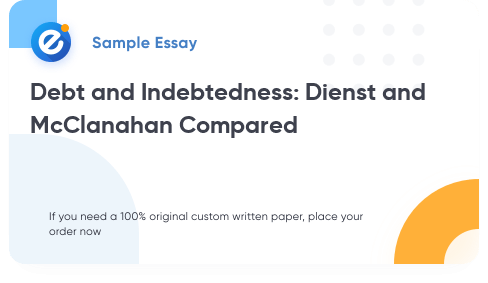
This paper compares and contrasts the views of Dienst and McClanahan on debt and indebtedness. The paper also highlights personal views how a key concept is at work in relation to the readings. In the conception of debt and indebtedness Dienst and McClanahan have presented disparate and dissimilar views on how societies are molded through social and political strata. The two argue that debt is definitely a means of socialization which ought to be accepted and even embraced by the people in the society. An important aspect that comes out from the argument of the two is that debt and indebtedness is no longer a commonplace assertion to the effect that credit is mainly a form of contractual exchange dependent upon by social order.
One major argument advanced by the two authors and on which they both agree is that debt especially to students is destructive in nature. In particular, they have noted the link between privatization and the credit given to students especially in view of the rising levels of debt related with students and the general transformations witnessed in the general speculative financial markets. An interesting point to consider in the analysis of the authors’ perception of debt and indebtedness to the society is the overall link between credit and political positions highlighting the movement of money from the lender to the borrower and back again, which implies the antagonistic rather than reciprocal nature of debts and indebtedness.
Calculate the cost of essay
The other area of comparison is the role credit facilities play in the society. Rather than set stage for mutual and obligatory functions within the society, debts and indebtedness is the ground upon which privatization structures are founded and in the process allow for development of political disciplines within the same society. To this end, there is a growth of new forms of political affiliations which highlights the confusion and financial indebtedness that many people find themselves in the particular society. This precipitates the proliferation of news media including newspapers, manifestos and others that are used by students as a way of expressing their solidarity for the similar fate of indebtedness that they collectively face. An understanding from this perspective is important especially in understanding the mutual debt faced by various groups in the society, student included. In essence, the two authors view a strong link between student debt and the financial forces which cause indebtedness to the students. As concluding remarks, McClanahan considers the inability of students to pay debt is a factor that enforces the transformation within the society in terms of financial independence as students who cannot pay back their loans are forced to leave with the burden for as long as they cannot be financially independent (Dienst, 2010, p.37).
Limited Time
special offer
In my view, the opinions revealed by both Dienst and McClanahan is a wakeup call for education systems to consider how different institutions including the governments give advance credit to students who are joining institutions of higher learning. Without proper care, the credit advanced to students is likely to imprison them for the rest of their lives as they continually become unable to pay those loans. In the end, the issue of credit to students will be a factor that will not only define the political affiliations in future but also be a cause for economic and social inequalities between the educated class on loans and those who went to school using their own money. It will also cause the stakeholders in the provision of student loans to have unmerited powers over the loans that students require when they are joining institutions of higher learning. As noted by McClanahan (2011, p. 65), “the arriving freshman is treated as a mortgage, and the fees are climbing. She is a future revenue stream, and the bills are growing. She is security for a debt she never chose, and the cost is staggering.” This is likely to be the case in future financial assistance to students.

